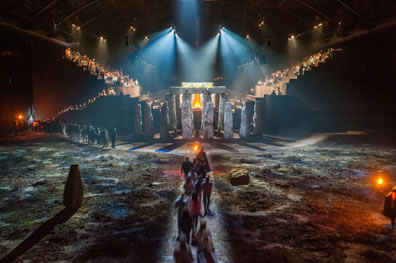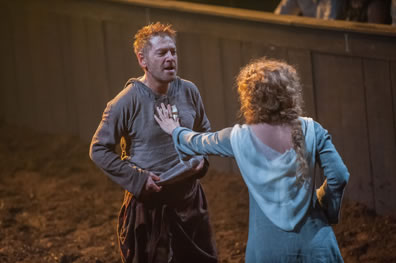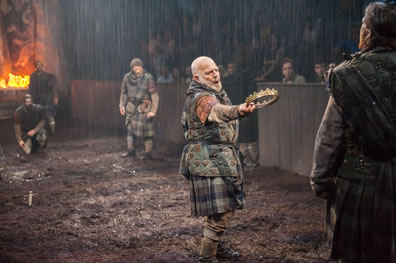Macbeth
Branagh's Spectacular Shakespeare
Park Avenue Armory, New York, N.Y
Saturday, June 7, 2014, A–5&6 (front row, Stonehenge end)
Directed by Rob Ashford and Kenneth Branagh

A clan of audience members is ushered through the heath toward their seats in grandstands alongside the set of Macbeth in the Park Avenue Armory's drill hall. It's a transformative moment, thanks to set designer Christopher Oram and lighting designer Neil Austin. Photo by Stephanie Berger, Park Avenue Armory.
We enter like Hogwarts students parading into the Great Hall, shouting our clan name, "Robertson!" assigned to us according to the location of our seats. We are led across a Scottish Highlands heath and past a full-size Stonehenge-like temple to our seats in one of two grandstands rising on either side of a long, muddy pit. Mirroring the Druid temple on the other end of the arena is another stone temple but with Christian iconography, where a nun tends to hundreds (it seems) of candles. Soon, two armies emerge dressed in authentic 11th century Scottish tartans and engage in earnest combat in that pit. You might think you've landed in a tournament at Medieval Times, until Kenneth Branagh speaks Macbeth's first line, "So foul and fair a day I have not seen."
So epic and intimate a production I have not seen. William Shakespeare's Macbeth is turned into a grand spectacle in the Park Avenue Armory's 60,000-square-foot drill hall while yet remaining a domestic noir murder, delving into the psychosis of love, ambition, and ambitious love. It's visceral battles, and it's intensely conspiratorial dialogue spoken in fluid verse. It's elaborate sets creating thematic tension, and it's magical effects rendered with simple stagecraft. It's the product of Rob Ashford, Broadway's current it director and choreographer, and Kenneth Branagh, the world's it Shakespearean actor and producer, giving us great fun with performances that yet leave us emotionally raw.
This production premiered at the Manchester (England) International Festival in July 2013, using the decommissioned St. Peter's Church for its theater, but it always ultimately was intended for the Armory's Wade Thompson Drill Hall, one of New York City's largest unobstructed interiors. Ashford and Branagh have gone to great lengths to immerse the audience in the story, beyond their transformation of the drill hall into 11th century Scotland itself with Christopher Oram's set and costume designs and an atmosphere, both natural and supernatural as Shakespeare describes in the play, created by lighting designer Neil Austin and illusion consultant Paul Kieve. We receive our clan assignments and wristbands identifying our allegiance upon entering the Armory and are sent to specific waiting rooms. Our play programs are clan-specific: The Robertson Clan originated in south central Scotland, just north of Fife, and we read that we are descended from King Duncan I who ruled from 1034 until his murder in 1040. Yes, that Duncan. "Tonight, the originator of the Robertson clan meets his untimely end," our program points out in its introduction.
The cast numbers 58, of which half are the ensemble serving as monks, warriors, and servants during the play and ushers before and after. It rains during the first battle, and we in the front row, at least, get wet. When Great Birnam Wood comes to Dunsinane, we can see the forest of soldiers coming across the heath. When Macbeth is humping Lady Macbeth, the two are backed up against the four-foot wall running in front of our seats and I'm so close I could flick Branagh's ear. Though I can't see exactly what he's doing with her, the audience opposite us vocally gasps. And if you happen to be sitting near where the Porter fixes his own drink, note that your own lap will suffer the literal fall-out. When the Weird Sisters first appear, seeming to float among the temple stones to our right and announce their intentions to meet Macbeth on the heath, they pronounce his name so forcefully and while pointing across the arena that we look to our left and, suddenly there, Branagh is poised with sword in hand on the church steps. The audience is too shocked to even applaud the star's first appearance (bless you, Branagh). Thereafter, we frequently glance toward one end of the stage or the other when a character's glance or gesture leaves us expecting to see some instrument of evil or good magically appear, instilling in us a palpable sense of the supernatural and a paranoia that grounds Shakespeare's lines in our inner selves.
One key to carrying out intimate and introspective moments in such an arena production is the blocking. The actors never stay still for long, constantly moving up and down the lists. Credit sound designer Christopher Shutt, too. The actors wear microphones but don't sound like they are miked (in contrast to Public Theater productions at Central Park's Delacorte Theatre), and sound effects and Patrick Doyle's score are sublimely mixed so as not to overwhelm the dialogue.
Ultimately, that is what a Shakespeare play is all about, the language. You can count on Branagh and any cast he assembles to deliver the goods (and the evils, for that matter, when appropriate). This is the fourth time I've seen him live (and I've seen all four of his filmed Shakespeares), and his command of Shakespeare's verse is perfection to my ears. He maintains the poetry of the verse structure without sounding poetical and speaks the rhetorical passages with natural ease, each word infused with energy, even in his characters' most introspective moments, creating vivid elocution. For me, always on paper and often on stage, the language of Macbeth is among Shakespeare's most obtuse; but not in Branagh's delivery, and the whole cast follows his lead.
The action plays out in the tension between Christianity at one end and a pagan spirituality on the other. The witches' domain is obviously the stone temple, though they wander onto the main playing area for the murder of Banquo and the apparitions (presented by actors emerging one by one from a large sheet undulating like a boiling cauldron). On the other hand, the Scots generally enter from the Christian end. Branagh makes two notable alterations to Shakespeare's original script (the Hecate portion, believed by scholars to be a post-Shakespeare interpolation, also is excised). First, he cuts the expository Act One, Scene Two, and replaces it with the actual battles being described there. Why not? At his disposal is a faux battlefield inside a real military fortress and a couple of dozen soldiers with which to wage war. He also enacts Duncan's murder in full view of the audience, not offstage. Argue whether this undermines Shakespeare's dramatic purposes if you will, but it does suit the thematic aesthete of this production, especially as the king's bedroom is placed in front of the Christian altar.
It's also notable that not only does Macbeth first appear at that end of the stage, but also that the nun tending to the candles turns out to be Alex Kingston playing Lady Macbeth. As her Lady Macbeth reads the letter from her husband, she moves to the center of the arena exhibiting unhindered excitement. She then learns of the king's approach and begins to formulate what might happen "under my battlements." She pauses, looks tentatively toward the pagan temple, and drawing a circle around herself in the dirt she speaks her incantation: "Come, you spirits that tend on mortal thoughts, unsex me here and fill me from the crown to the toe top-full of direst cruelty." We can't help feeling the potency of her pagan prayer; Christian redemption doesn't hold a candle to it.
Lady Macbeth here is overcome with the rush of love. Between them, Branagh and Kingston create the most happily married couple in the canon. However long they have been betrothed, they have quenchless passion for each other, a lust bred of true love, a mating of souls as well as bodies, hearts as well as heads. Branagh's Macbeth, returned from the wars, is already unbuckling as he strides toward his wife (he knows Duncan and company are fast approaching, so he hasn't much time—even if he could endure one more second apart from his wife's touch). When Duncan does arrive and Lady Macbeth comes out to greet him, she is still pulling her gown up over her shoulders, and her attendant gentlewoman (Katie West) buttons up the back of the gown as Kingston delivers Lady Macbeth's welcome.
Branagh's Macbeth is not necessarily harboring thoughts of regicide after his encounter with the Weird Sisters, but he is calculating how he could "o'erleap" his way to the crown. Duncan, you see, is no doddering saint of a king. As played by John Shrapnel, he is a bowling ball of a warrior leading a loose federation of tribes toward some concept of national security. He's both brave and gregarious with a bearing that inspires fealty and fear in the thanes.
In fact, the most significant thing Macbeth does comes between Scenes Three and Four in Act One: He writes his wife, his "dearest partner of greatness"—Kingston positively shivers when she reads that description—"that thou mightst not lose the dues of rejoicing by being ignorant of what greatness is promised thee." When Lady Macbeth asks her husband when Duncan "goes hence," Branagh makes clear in Macbeth's answer that murdering the king is not on his mind, at least certainly not that night when he is a guest in their home. Lady Macbeth, meanwhile, has made clear in her earlier soliloquy that foremost in her mind is her husband's chance at greatness, which she feels he deserves sooner than later, and she knows his own sense of honor is the only real obstacle that needs o'erleaping. In their state of love, so wholly devoted to each others' happiness and wish fulfillment, they get swept away in the tide of opportunity, thrusting them to and through the murder of Duncan.
Out of this dynamic, Branagh gives a poignant reading to one of Macbeth's lines after the Banquo banquet ghost scene. The Macbeths, alone, sit at the table as he discusses his intention to visit the Weird Sisters and his next step concerning Macduff. Their manner is one of emotional exhaustion, as any husband and wife trying to come to grips with some great household crisis (such as a layoff, learning your child is doing drugs, falling victim to a financial scam, or murdering your king in your home). When she urges him to sleep, Branagh's expression turns dismissive and disgusted. "Come, we'll to sleep," he says sarcastically. "My strange and self-abuse is the initiate fear that wants hard use," and he twirls his crown across the table while giving his wife a look that says, "this is all your fault, but I'll never say it." "We are yet but young in deed," he says, getting up and walking off by himself. A Macbeth and Lady Macbeth who are, essentially, no different than you and your spouse in your passionate ambition for each other bring this play's themes unsettlingly close to home.

Above, Macbeth (Kenneth Branagh) can hardly contain himself upon returning from the wars and a fortuitous meeting with the Weird Sisters and seeing Lady Macbeth (Alex Kingston) who presses his letter to her against his chest. Below, Duncan (John Shrapnel) pretends to concede his crown to the invading army in a rain-soaked battle during the opening sequences of Macbeth at the Park Avenue Armory. Photos by Stephanie Berger, Park Avenue Armory.

The timing of this scene is important, too, in that it comes not after Duncan's murder but Banquo's. In most productions I've seen, the act of regicide is the play's turning point, when the Macbeths begin spiraling into psychopathic behavior. This production makes Banquo's tragedy its centerpiece moment, achieved, in part, by depicting him as much older than Macbeth—more like an uncle than a peer—and through the entrancing performance of Jimmy Yuill. His Banquo regards the Weird Sisters in a humorous vein, though he's intrigued by what they say, but when he senses that Macbeth might be regarding them too seriously, he offers some advice: "Oftentimes, to win us to our harm, the instruments of darkness tell us truths, win us with honest trifles, to betray's in deepest consequence." Banquo is dead-on-right on that one, isn't he? Macbeth finally sees how right he is when Banquo's ghost appears, bloody and staring at him not just accusingly but questioningly—"Why?"—and even in a manner that seems to say "You stupid git."
"If thou canst nod, speak too," Macbeth yells at the ghost. "Thou has no speculation in those eyes which thou dost glare with." Though the ghost never speaks, Macbeth understands its meaning: Macbeth had his friend, mentor, and essential wingman in combat—innocent in everything except that he had a son—needlessly slaughtered. Macbeth encounters the ghost almost immediately after learning that Banquo's son escaped the attack, so the vision, seen only by him, condemns Macbeth to the knowledge that the prophecy of Banquo begetting kings remains intact. Macbeth can't change fate.
And so he gets up from the dining table intending to visit the Weird Sisters and find out what fate still has in store for him. His wife is no longer a factor. Her husband's love seems to vanish in an instant, and he thereafter closes himself off to her. She can't handle that.
"All our yesterdays have lighted fools the way to dusty death," Macbeth says in his meditative eulogy upon Lady Macbeth's death. This famous passage, like Hamlet's "To be" speech or Prospero's "We are such stuff" speech, can be a great stand-alone passage and is often delivered in that manner in the play. But in this production it is coming from a man whose overflowing well of passion and love had become bone dry because he and his wife didn't know how to tap the flow, and Branagh's delivery is as haunting as you'll ever hear this speech given.
It also signifies a change in Branagh's Macbeth: He had been manic in his tyranny and defiance; henceforth, he merely goes through the motions, knowing his inevitable demise is approaching at the hands of some man who is not born of woman; knowing that Macduff will somehow be an instrument in that fate; and knowing, most of all, that without the great love he had known, his life has become "a tale told by an idiot, full of sound and fury, signifying nothing."
Eric Minton
June 13, 2014
Comment: e-mail editorial@shakespeareances.com
Start a discussion in the Bardroom



 Find additional Shakespeareances
Find additional Shakespeareances